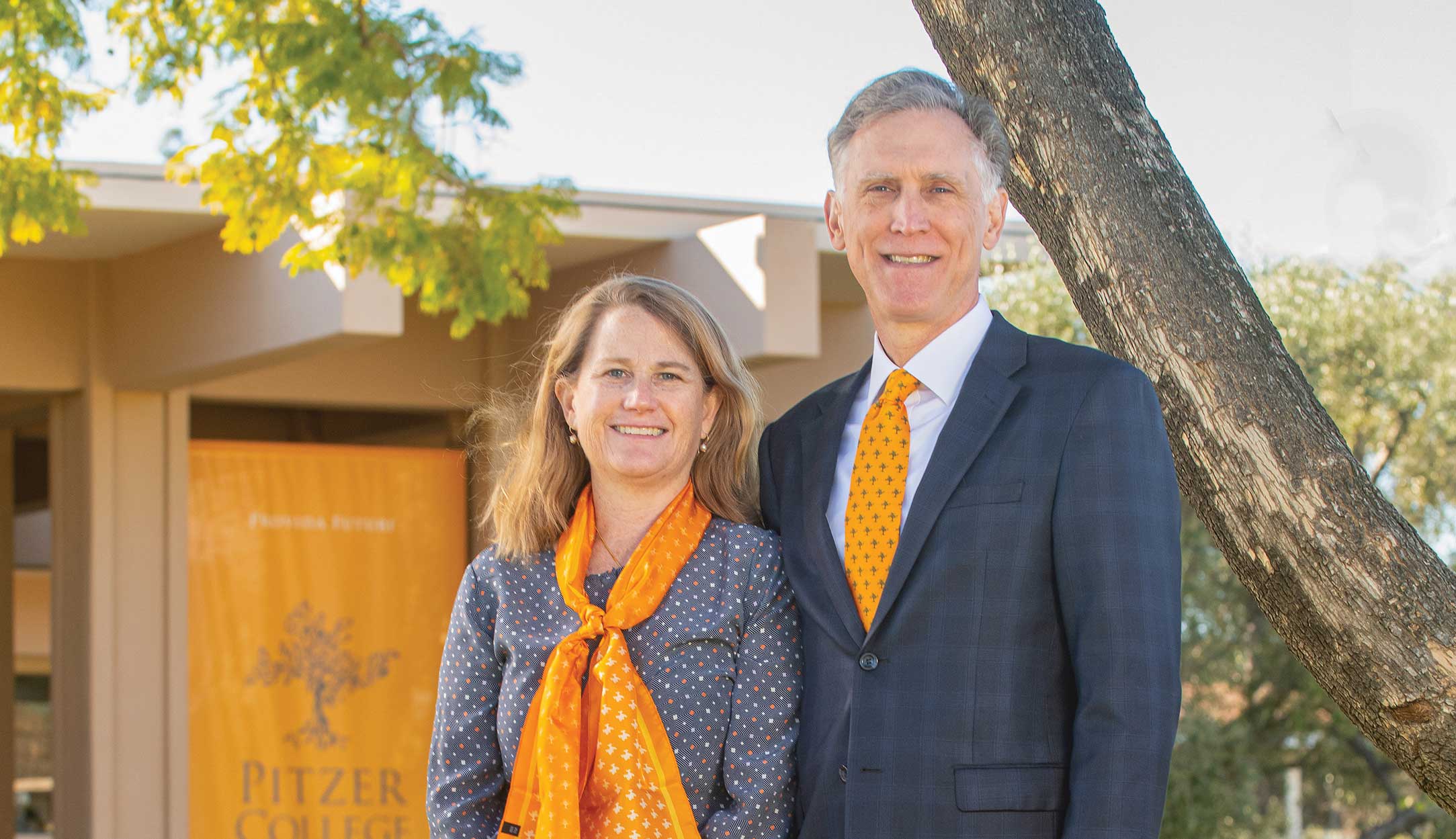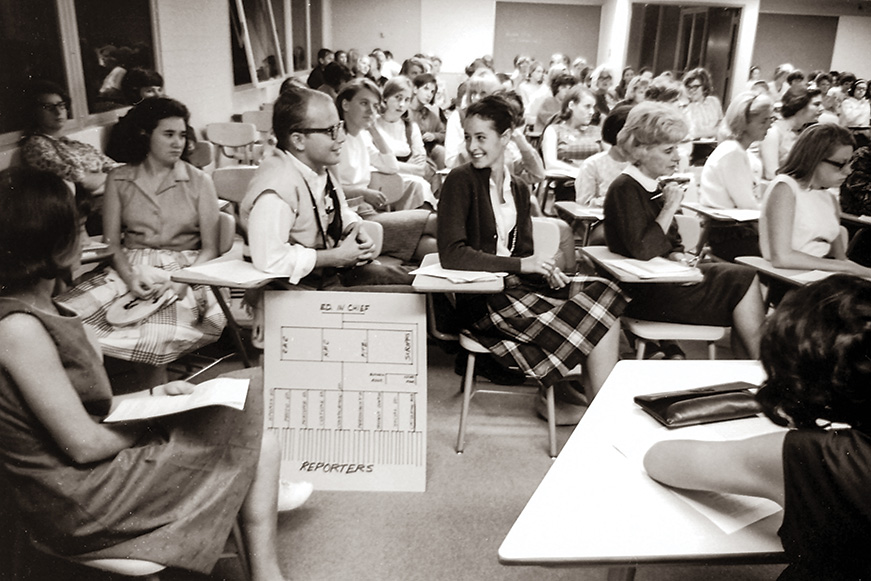
Back to His Roots
At a time when many college presidents are grappling with their roles, Strom C. Thacker is ready to meet the challenges and opportunities that he sees ahead for Pitzer College
By Nick Owchar | Fall 2023 Issue
TWO EPIPHANIES.
That’s what marks two important moments in Strom Thacker’s higher education career.
The first came when he was a sophomore at Pomona College.
One afternoon he was rushing home to wash off the clay dust covering him from head to foot (he worked in the ceramics studio in the Art Department) and get ready for a night out, and that’s when it happened. His life suddenly made sense to him.
“After experiencing all the challenges my family faced when I was growing up, I felt a clarity I hadn’t sensed before. It was a big aha moment. I don’t gamble, but it felt like three cherries on a slot machine lining up,” he recalled. “I felt what I was doing there and what I wanted to be starting to fall into place across the board—in the classroom, in the residence and dining halls, and in social life. I felt like I was where I belonged. I had no idea where my path was leading, but I knew I was finally on it.”
Cut to 30 years later, as the world entered quarantine during the Covid-19 pandemic, and that’s when the second epiphany took place.
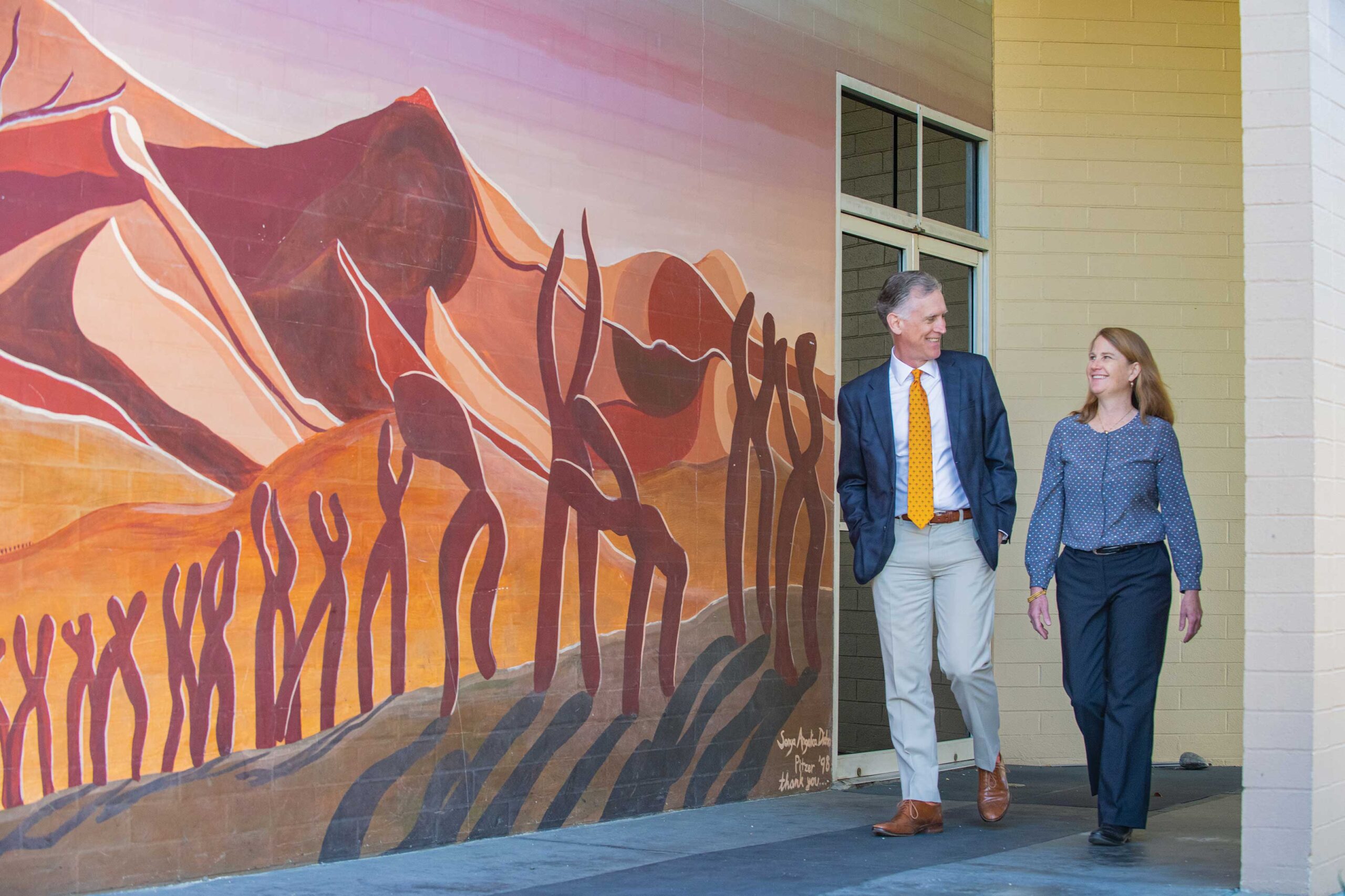
The Thackers walk in front of an Avery Hall mural during their visit to Pitzer earlier this year.
A respected scholar and educator in Latin American political economy, Thacker was then serving as dean of the faculty and vice president for academic affairs at Union College in Schenectady, New York, when Covid struck. The pandemic laid bare the financial struggles of so many students, and that made him see—as someone raised in mostly single-parent homes where money was always tight—that having a greater impact on student lives would require rising to the presidential level.
“I wanted to do more,” he said, “and I realized the only way to do that was to seek a larger role.”
With his selection as the seventh president of Pitzer College, and the start of his tenure this summer, Thacker, 57, sees his life coming full circle. His 30-year career in higher education started in Claremont and has taken him to Latin America, up and down the East Coast, and back again to Claremont, a city that has played such a formative role in his identity that it feels like a second home. He returns with a renewed sense of mission and a drive to help students.
Participant caught up with Thacker this spring to discuss his career, insights into higher education, personal and professional experiences, the challenges of leading today’s colleges, and the exciting opportunities that he sees ahead for Pitzer.
Participant: How do you feel about returning to Claremont after 35 years?
Strom Thacker: This is really a special homecoming for me. Claremont has played such a critical part in the formation of my identity in higher education. Several decades may have passed and a lot has changed, but it still feels familiar here. Coming back still feels like coming home.
P: You’ve said that your options were limited when you wanted to go to college. Why did you feel like The Claremont Colleges were off the table?
ST: My parents were both 19 when they had me, and resources were always a challenge for us. They did a really good job of keeping me from realizing how tight things were when I was growing up. Looking back now, I can see that we faced food insecurity at times and didn’t always know where the next paycheck would be coming from. We moved around, too; my family were serial renters.
My father didn’t finish college and went into the workforce. My mom didn’t go to college right away because she was raising me. When I was ten, they divorced, and I was able to live with each of them because they lived in the same town. They had to work so hard just to pay the bills, and the challenges they faced really limited the resources available to us. I could see how difficult it was for them. I could see what a challenge it would be to afford to go to a top private college.
P: Despite the challenges of your family’s situation, you applied to Pomona College. Why?
ST: Pomona emerged as my top choice early on, but I was not sure if I could swing it, even if I got in. What really convinced me was a Pomona admissions officer explaining their policy to meet full demonstrated financial need. She assured me that if I were admitted, they’d make sure I could attend. From that moment on, I had my heart and sights set on Claremont.
I think that all students should have a chance like that, that every student should be able to go where they fit best academically and personally, regardless of resources. That’s not the case universally in higher education today.
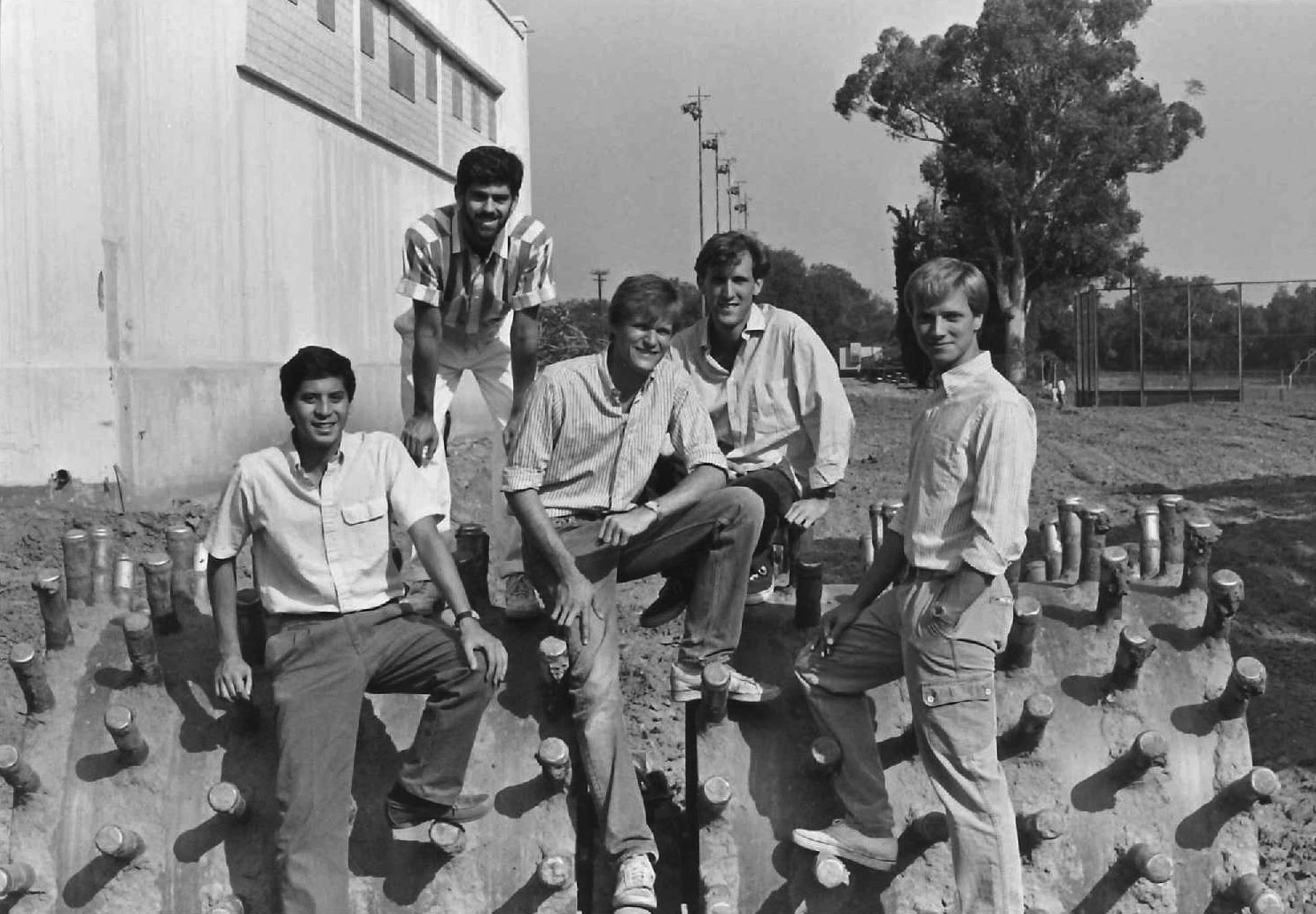
Thacker with a group of friends on the construction site of Pomona College’s Rains Center, which has been renovated and expanded into the new Center for Athletics, Recreation and Wellness, in Spring 1988. From L-R: Jay Perez, M. Sam Bower, John Corman, Thacker, and Todd McGinley. All PO ’88.
(PHOTO COURTESY STROM THACKER)
P: You shared the story about walking home from your work-study job at Pomona College and experiencing a moment of clarity about your life. Do you have other good memories from your days as a college student?
ST: Just about every memory that has stuck with me from that time is a good one. It’s where I became who I am today, where I figured out who I was and why I was here. I didn’t know at the time that my experiences then would eventually bring me back to Claremont, but that’s when I fell in love with learning, research, and the academic life. Within just a few months of graduating, and with some keen advice from my then-partner and now-spouse whose grandfather was a professor, I realized that I wanted to spend my career and life in higher education. College was truly a life-changing experience for me.
P: It was life-changing not just academically, but personally too, right?
ST: Absolutely. I met my wife Isabelle while I was spending my junior year in Madrid. She was a student at Middlebury, and Pomona and Middlebury then shared a study abroad program in Spain that we both attended. That was certainly the best year of my life to that point and remains among the most formative. In many ways, I can say something similar about all four years I spent in college.
P: How do you mean?
ST: I feel like I hit a reset when I started college—culturally, intellectually, and socially too. It was so different from high school, and I was able to really be myself in ways that were unapologetic and authentic. I felt more self-confidence as a person and didn’t worry about being someone that I felt others wanted me to be. I became much more self-aware, and truer to myself.
I certainly don’t expect or want every Pitzer student to replicate my exact experiences, but I do want them to gain their own special insights from their experiences. I want them to be as self-reflective and mindful about their undergraduate years as they can be. It’s so easy to get caught up in a million different things that you can forget that these really are magical years, and I want all Pitzer students to get as much as they can out of them.
P: Did you ever visit the Pitzer campus when you were at Pomona?
ST: Yes, I actually took a class here. I took only one course outside of Pomona during my whole undergraduate career, and it was at Pitzer. It was called International Political Economy, taught by Professor Thomas Ilgen.
As a faculty member at Boston University and Union College (and twice as a visiting faculty member at Harvard), I’ve taught a similar version of Tom’s class. In fact, I’ve taught that class more than any other over the course of my career. And one of the textbooks I use is a new edition of a book Tom assigned when I studied with him back in 1987–88. So, my exposure to Pitzer was limited to only one course, but it has really stuck with me.
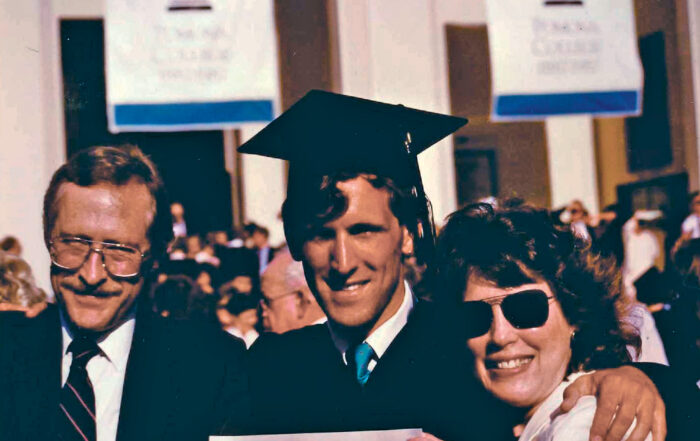
Pomona College Commencement, May 1988: Thacker with his parents Roger Thacker and Terry Strom.
(PHOTO COURTESY STROM THACKER)
P: Did you realize as an undergraduate that you wanted to be a professor and a higher education leader?
ST: No, I didn’t even plan on attending graduate school. When I graduated, I worked for a law firm in San Francisco just long enough to decide I didn’t want to be a lawyer. I decided on graduate school, to get a doctorate in political science and focus on political economy and Latin America, where I could use my Spanish language skills. It was also an area where fascinating things were happening at the time in development as countries in the region started to emerge from the debt crisis and pursue globalization, with all that entailed. I received great guidance from one of my Pomona mentors, Professor Betsy Crighton (with whom I’ve stayed in touch ever since). I spent my graduate career at her graduate alma mater, UNC-Chapel Hill, which is well known in both political science and Latin American Studies.
What is compelling is how the world has come around to Pitzer’s values now. The College has always emphasized the values of interdisciplinarity, sustainability, social engagement, social justice, applied learning, and community engagement, and now you see the rest of the world of higher education finally embracing these ideas.”
—Strom C. Thacker
P: You’re fluent in Spanish. Did you learn it during your first academic job in the 1990s with the Instituto Tecnológico Autónomo de México (ITAM) in Mexico City?
ST: I’d been studying Spanish since high school, but teaching international relations in Spanish in Mexico certainly helped a lot. I was reasonably comfortable with the language when I got to Pomona, where I continued studying it. But it was spending a year in Madrid that really cemented things for me. I lived with a Spanish family, took all of my classes in Spanish and traveled around the country quite a bit, both on program excursions and on my own. I realized the language was really clicking for me when I started dreaming in Spanish after a few months in Madrid.
P: Besides ITAM, you have held several prestigious appointments that seem like dream roles for anyone with an academic career. What made you decide to shift from a life of scholarship with great chances to see other parts of the U.S. (and the world) into a life of leadership?
ST: That’s a great question. Being a professor is one of the best jobs in the world. I loved it, and still do. Going into leadership really wasn’t something that I planned. I was invited to apply for an associate dean of faculty position when I was at Boston University, and the dean who nominated me wanted me to take the nomination seriously. I think she saw something in me that I had not yet recognized in myself.
I’d served in some leadership roles already at the time so I felt like I had some of the right preparation for it. But I’d never actively considered moving into a larger role before that conversation with the dean. I was happy in my faculty life. But when I was nominated for the associate dean position, I thought, you know what? I’ll give it a try. What’s the harm? If I don’t get it or enjoy it, I’ll go back to a job that is still part of my core identity: being a professor.
P: You ended up getting selected for that position, right?
ST: That’s right, and within a few months I’d fallen in love with the work. It was so rewarding to contribute to something larger, at the institutional level. I enjoyed it the most when I felt my work was facilitating the good work of many others like hiring a generation of talented, diverse new faculty, helping develop them and bringing them along, seeing them succeed, getting tenure and building programs. I just found it so rewarding, almost immediately.
P: More rewarding than teaching and research?
ST: Just different. I’ve always loved my teaching and scholarship, but I felt that my impact was limited to those in my classroom or those who read my published work. But in my leadership role my impact was exponentially expanded through all the faculty I was working with.
A colleague at BU referred to this kind of work as philanthropic leadership—when your good work enables that of others. I think that phrase is just right. That’s the kind of approach I’ve applied to my leadership roles ever since.
P: This spring you attended Alumni Weekend 2023 and introduced yourself to members of Pitzer’s alumni community. How was that experience?
ST: It was wonderful to be on campus and to meet so many alumni at our first in-person celebration since 2019. I enjoyed being able to speak directly to people, both in groups and individually, rather than through email, phone, or video. It was also great to meet so many from across the spectrum of class years, from the earliest founding classes of Pitzer to our more recent graduates. Each brings a unique, invaluable perspective and helps make Pitzer so distinctive and so special. I’m excited to work with our advancement and alumni relations teams to build even stronger ties with our alumni. I know I’m far from alone in appreciating the pivotal role that my undergraduate experience has played in my life.
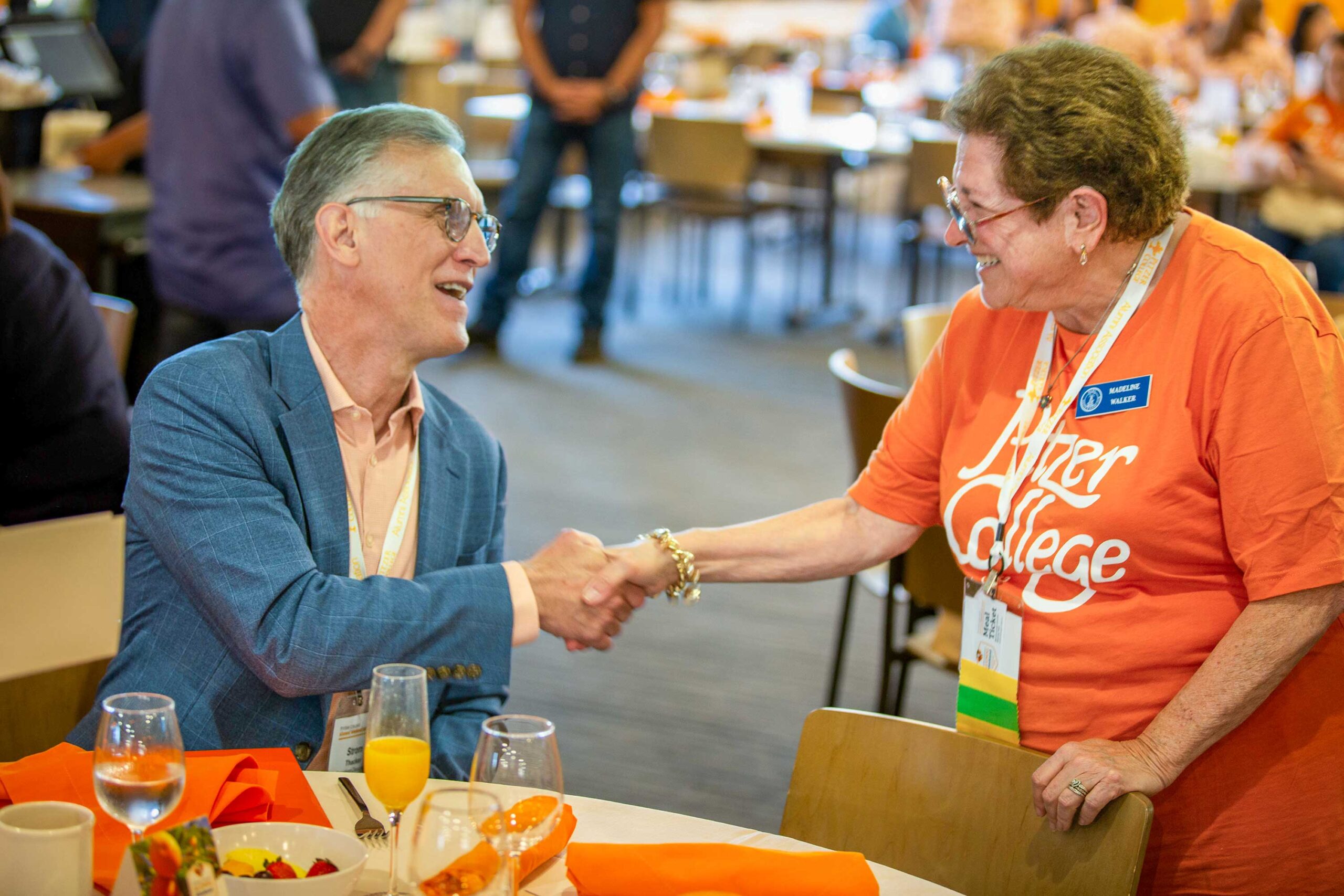
President Strom C. Thacker met Madeline Pinsky Walker ’73 and other community members during the Alumni Weekend mimosa brunch in McConnell Dining Hall.
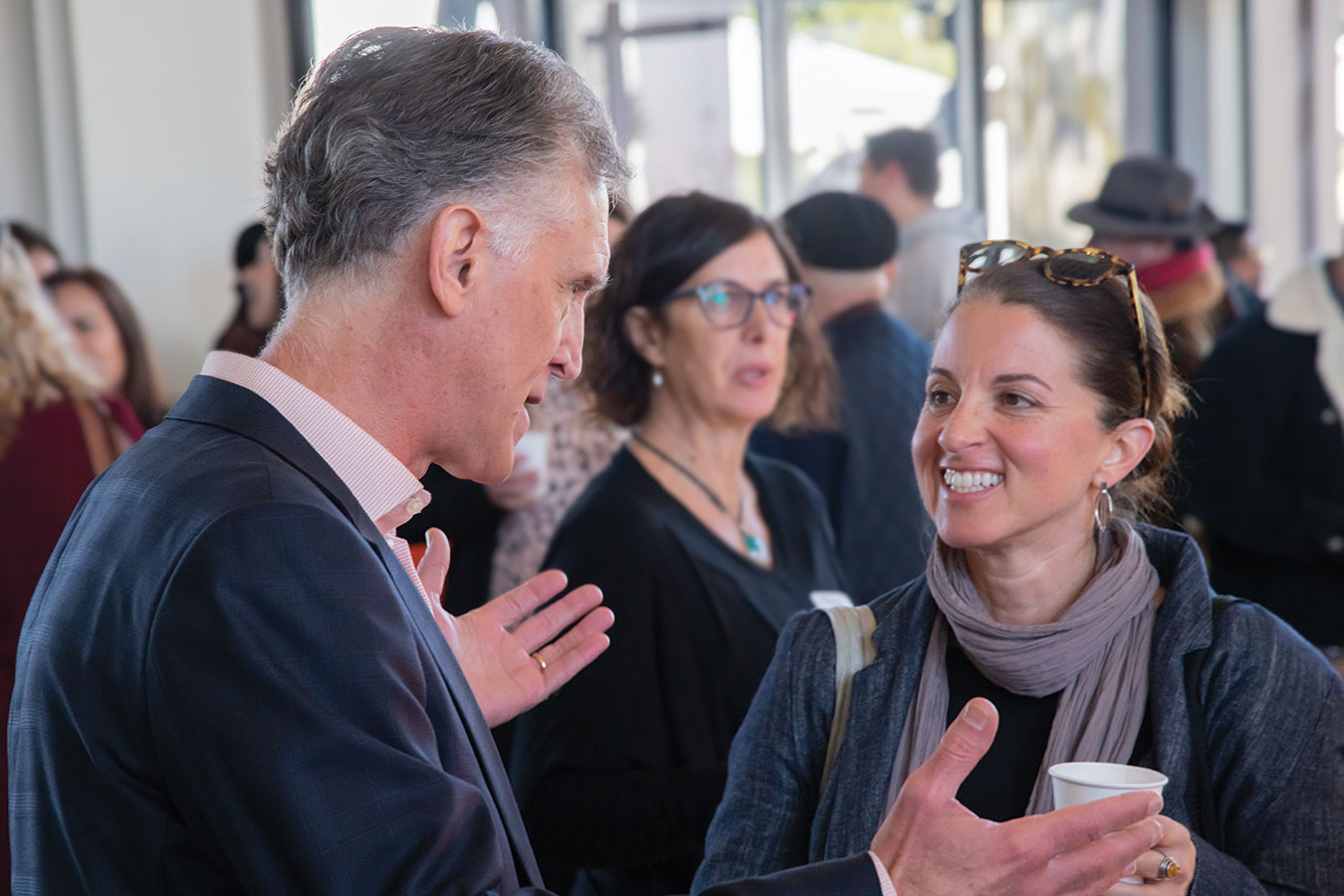
A February campus visit enabled Thacker to meet faculty including Associate Professor of Classics Michelle Berenfeld.
P: Are alumni concerned or interested in anything specific that they want you to address as president?
ST: What really struck me is how much and how deeply our alumni care about their alma mater and how much they want to make sure that it’s in good hands. They wanted to know about my past professional experience and what has led and drawn me to Pitzer. They seemed pleased to know that I’m a Pomona alum. I think it was reassuring for them to know that I understand the culture of The Claremont Colleges from the student perspective. Many of them also shared with me that they want to make sure that access to a Pitzer education is available for everyone who qualifies for admission. They’re rightly focused on that.
P: A recent USA Today report notes a surge in student activism across the country. Student activism has always been the norm at Pitzer since its earliest days. How do you feel about this? Are you glad that students are taught to exercise their voices?
ST: In many ways, the rest of the world is still working to catch up to where Pitzer has been for decades in its focus on student engagement, sustainability, and social justice. We’re living in times when it’s essential for younger generations to express themselves and be heard. They should have a say in the world that they’ll be entering when they leave Pitzer, and it makes sense that they should start practicing that activism now. The world needs to hear their voices and to have their help to solve the unprecedented problems it faces today.
P: Even if it means those voices might challenge you and the administration?
ST: Yes, even if that’s the case.
P: Why?
ST: Because it’s a part of their education and self-discovery process; it’s an important part of figuring out who they are, what they believe, and how they will work to make the world a better place. They’re acquiring and developing the tools and the training here at Pitzer to help them detect and perceive injustices in any organization. It’s understandable that one of the first they see is the school they’re attending. I love the fact that Pitzer is proud of its activist heritage, and I’ve found an activist spirit is alive and well at other schools where I’ve worked as well.
One key to maximizing this element of our core educational mission is making sure that we all live our community values to their fullest ideals by engaging in respectful, constructive dialogue and conversation, rather than simply yelling past each other. Naturally, we may not always agree. But we can always seek to better understand the issues at hand, and, importantly, each other and ourselves.
Your question reminds me of a story from my Boston University days. One day when I was working in my administrative office, I heard a protest march coming down the street and wondered if our son—who was then a student at BU and involved in a number of social justice initiatives—might be in that group. I looked out the window to see him helping lead a peaceful march down Commonwealth Avenue at that precise moment. It was a proud moment for me, both as a parent and as an administrator.
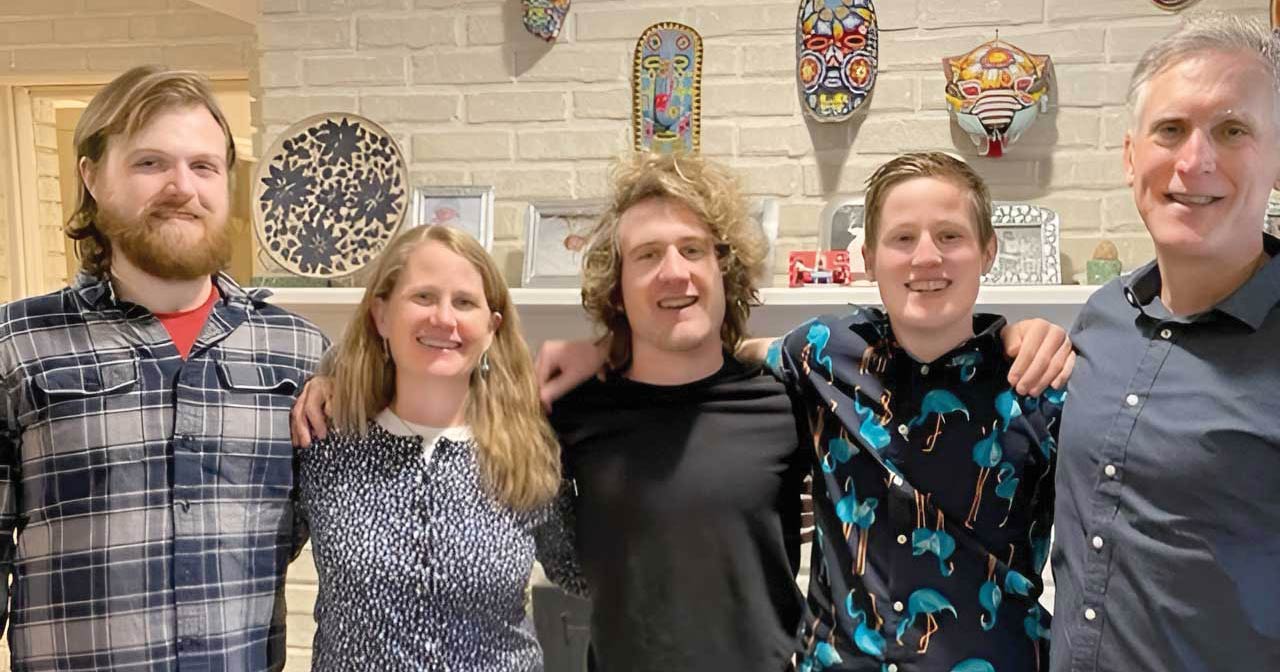
Meet the Thackers (from left): Matthew, Isabelle, William, CJ, and Strom.
(PHOTO COURTESY OF STROM THACKER)
P: A recent Chronicle of Higher Education report notes that many critics are asking if it’s even worth it to take on the job of college president. How would you answer them?
ST: It really depends on the school, the person, and the fit. It’s a much harder job than it used to be, without a doubt. Every year the average tenure of college presidents falls (to fewer than 6 years now). I asked one of my mentors who’s been a college president how his outlook on the job has changed. Specifically, I asked if he’d do it all over again now (as opposed to when he first got into the role). There was a long pause before he answered, “I think so.” He really had to think about it given the landscape of higher ed today. That was an instructive moment for me.
There are a lot of schools where I wouldn’t want this job and just a few where I would. Pitzer is one of the few in that special category for me. Pitzer is unique, a word I don’t use lightly. After spending two-plus decades in large research universities (going back to graduate school), I chose to move back to the small liberal arts college sector because I wanted to be at an institution guided by a shared, values-based mission. In so many ways, Pitzer is a model in how it lives its values and its mission, and the way the faculty and staff help all students to achieve and succeed (and support each other in doing so) inspires me. I still get a thrill out of the practice of building something bigger than any of us, of contributing to the development of an institution that serves such an important purpose in higher education and the world. Even though the presidential role may be harder than it used to be, I still find it rewarding and fulfilling.
P: What do you think are Pitzer’s greatest strengths?
ST: It’s interesting to look at it from a longer-term perspective. While in one sense I’m new to Pitzer, I’ve observed and admired this school for a very long time. I first arrived in Claremont in 1984, and I think Pitzer has stayed true to itself and its values and honed them ever since. What is compelling is how the world has come around to Pitzer’s values now. The College has always emphasized the values of interdisciplinarity, sustainability, social engagement, social justice, applied learning, and community engagement, and now you see the rest of the world of higher education finally embracing these ideas. When you look at all the challenges and opportunities we’re facing, it becomes clear that the world needs Pitzer now more than ever.
P: You sound very optimistic about Pitzer’s future. Why? What do you imagine?
ST: I am. Pitzer just has so much going for it: its mission, its values, the lived student experience, its community, and the consortium, to name just a few. Our faculty and staff impress upon students the notion that anything is possible, that they can make a difference, and then help them acquire and develop the tools to make that happen. It’s not just lip service or platitudes here. Pitzer continues to attract such an impressive, bright, and talented group of students. We have some real changemakers on our campus, and they’re doing amazing things, with so much more to come. We will continue moving forward to make sure they have as many opportunities as possible to hone their knowledge and skills to prepare for the world after graduation.
You can see this happening across the campus (and beyond) in real, tangible ways, on a daily basis.
P: Such as?
ST: To cite just one example among many, look over at the construction of the Nucleus science building, which will open in fall 2024. Building on our existing strengths to create new ones, these integrated science facilities are going to take our interdisciplinary approach to education to a whole new level for our students and Scripps students.
P: For you every answer seems to circle back to making sure that our students have a chance to develop their sense of self-identity and discover their own path forward, right?
ST: Yes, exactly. That’s what I experienced all those years ago as an undergraduate. I want that for our students, too. I could not be more excited to be here.
Strom C. Thacker: A Brief Biography
Hometown
Palo Alto, California
Education
PhD, University of North Carolina, Chapel Hill (1996)
MA, University of North Carolina, Chapel Hill (1991)
BA, Pomona College (1988)
Family
Spouse: Isabelle
Children: Matthew, CJ, and William
Books
A Centripetal Theory of Democratic Governance (Cambridge University Press) (with John Gerring)
Big Business, the State, and Free Trade: Construction Coalitions in Mexico (Cambridge University Press)
Career Highlights
Dean of the Faculty and Vice President for Academic Affairs at Union College in Schenectady, New York
Associate Dean of the Faculty Social Sciences, College of Arts and Sciences, Boston University
Professor of international relations and political science, Boston University
College of Arts and Sciences Award for Teaching Excellence, Boston University
Assistant Professor, Instituto Tecnológico Autónomo de México

